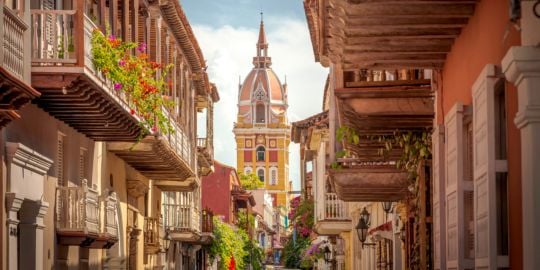Hi everyone,
It is widely agreed that speaking Spanish is essential for a successful integration in Colombia. Do you agree? Share your experience!
Do you speak Spanish? If so, where did you learn this language? Where can one attend a language course in Colombia?
If not, how do you cope with daily activities? Is it easy to communicate in a different language with Colombians?
Thank you for sharing your experience.
Priscilla
Speaking Spanish in Colombia
Spanish is esential here. Mine is terrible. Personally i found English speaaking Colombians and gringos to help me out and i take privte lessons...but i find it very difficult. But i love living in Colombia. Its beautiful as are the people.
Of course my new president in my home country not making it any easier!
Hi Priscilla,
Good questions. Managing daily life in any country where you don't speak the native language is difficult but in my experience not impossible. I've not had any formal Spanish language lessons and pickup up what I do know by simply listening. I don't recommend that to anyone else.
I know several Colombians who speak English and they have helped me interact with non-English speaking doctors and bureaucrats. Not an ideal situation but it works for me.
I would not have a good experience in a class situation because I have severe hearing loss. Being in a crowd where more than one person speaks at a time, and here it seems that in a group everyone always talks over each other, means that I understand no one.
For those who know the language and have good hearing multiple conversations going on at the same time never seems to be a problem for them. For me it means that I hear them all and understand nothing.
Spanish is so different that I don't know if I'll ever have a decent command of it. Here's one example that demonstrates the problem for me.
According to Google translate, the English word exercise has no less than 12 words in Spanish that indicate exercise. In English the meaning of the word is determined by the context of the use. In Spanish the context determines which word is proper to use.
I've been in Colombia for 8+ years and speak Spanish about as well as a one year old native.
My reply may not have answered your questions but I felt it necessary to express for you and others how difficult and frustrating learning Spanish can be and that I've not found anyone who can tutor me.
Regards,
Caliray
I am native born USA gringo but have been speaking Spanish for many years. Although very fluent, I still consider my Spanish to be about 50% as effective as my English. To answer the question, yes, Spanish is essential (indispensable as the Spanish say) if you are going to spend a lot of time in Colombia. I have not met that many people who speak English so I don't see how you can survive without Spanish.
Ejercicio is the word for exercise in Spanish. I am curious to know what the 12 words are that you are referring to. I can't think of that many and I am advance level fluent.
Jubilado without friends id never have been able to aquire things needed like my cedula, insurance,dr license, visa, etc. Its not easy.
This is from Google Translate for the English word exercise.
Translations of exercise.
noun
el ejercicio exercise, practice, drill, practicing, test
el entrenamiento training, workout, coaching, practice, exercise, practicing
la prueba test, proof, evidence, trial, assay, proving
el ensayo test, trial, assay, essay, testing, exercise
verb
ejercer exercise, exert, practice, perform, pursue, wield
ejercitar exercise, train
hacer ejercicios exercise
ejercitarse exercise, train, drill
entrenar train, coach, exercise
valerse exercise, make use of, seize upon, avail oneself of, seize on
usar de exercise, observe
emplear use, employ, hire, engage, invest, occupy
llevar de paseo exercise, take out
hacer pruebas exercise
preocupar worry, concern, trouble, bother, preoccupy, perturb
If you find any in this list to be incorrect feel free to offer corrections to the Google Translation results. Google is always looking to improve their results.
There is one other thing to consider. Colombian Spanish and other versions of Spanish also seem to have different words for the same English word. Native Colombians also tell me that there are different regional dialects within Colombia much like what you find in the U.S. Being from Texas, USA and having lived in some northern states I found there were many phrases used in incomprehensible ways for a southerner until I asked what they meant.
jubiliado wrote:To answer the question, yes, Spanish is essential (indispensable as the Spanish say).
Yes, Latinos do say indispensable. The word is spelled the same in English.
Then there's the Spanish word sensible -- sen-SEE-blay -- which means “sensitive.” Sensato y prudente are words meaning “sensible.”
Speakers of Spanish also say responsable. That's the Spanish-language spelling. The equivalent word in English is spelled “responsible.”
Resource: www.wordreference.com
And several more ways to say necessary or essential:
El español es necesario en Colombia.
Es menester hablar español en Colombia.
El buen conocimiento de español en Colombia es imprescindible.
OsageArcher wrote:And several more ways to say necessary or essential....
And the ever-popular idiom hace falta. Falta means “lack” .. or “shortage" of something.
Hace falta un cuchillo para cortar esta torta. A knife is needed to cut this cake.
Te hace falta ejercicio. You need exercise.
Hello, my wife is from Bogota, Colombia and we lived there for around two years before we moved to the States. My Spanish is terrible but I still managed to survive. I taught English to make money so everyone I dealt with spoke English for the most part. I met other Native English teachers there that did not speak much Spanish and were surviving without much trouble. Most of the Colombians are not going to speak much English but they will do almost anything to help you out. You should be just fine there with the Spanish that you pick up and practicing your acting skills. I would sometimes have to act out what I was trying to say. I looked like an idiot but it got the job done. Also at the immigration offices, they have people that work there that speak pretty good English. In the bigger cities, you will have less trouble finding people that speak some English but outside of that, it will be more difficult.
If you need to practice your Spanish before you go my wife and I started a Youtube channel where she is teaching me Spanish. Maybe it would help you out to hear Colombian Spanish from a Native speaker before you go.
https://www.youtube.com/channel/UCIdFcL … rormG_nU8w
Cheers!
As a guy that can rap fairly well with Mexicans and Ecuadorans and Puerto Ricans, I have to say that Colombian Spanish gives me fits. They talk very fast and they have their own words that other countries don't use. "A la orden!"
Here's just one example. I was dating a girl in Bogota. I said, "When are we going to the store to buy food?" She says, "Ahorita." So I go put my shoes on and wait by the front door.
She asks, "What are you doing?" I said, "We're going to the goddamn store, toots! Let's go!" She says, "Ahorita." I'm like, "Yeah, ahorita! Get your your shit!" She just looks confused and stands there.
To everyone else in the Spanish world, "Ahorita" means "Right this very second." To Colombians it means, "Whenever I get around to it."
The Colombians can drive you a bit batty with their Colombianism. Just try to be patient and not strangle anyone. 
Here's some Colombian Spanish that they will use a lot. It's not what you hear in other countries.
Que Mas? - What's up? They also use "Que Tal?" a lot.
Que pues? - Same as Que mas.
Bien o que? - Another greeting they like.
Chevere - Something is cool.
Plata - Money. They don't use dinero much.
No dar papaya - Don't make yourself a victim. Don't wear rolexes and gold chains, etc.
Parcero - Good friend.
Parce - Dude
Chino - Child. This one kept screwing me up, because to me Chino is a Chinaman 
Mono - Blonde person. Means a monkey everywhere else. And I can't figure out how they got monkey for a blonde.
Guaro - Slang for Aguardiente. That licorice flavored sugar liquor they love.
Guayabo - hangover. Every Spanish country has their own word for hangover.
Estas Amanado? (tilde sound over the N) - Are you happy? Instead of using Estas feliz?
Que pereza! - Something is a pain in the ass.
Maluco - something is unpleasant
Jue pucha! - It's a more harmless way of saying Hijo de Puta! or Que Puta! They say all of those a lot and it's funny. Even the kids say it. It's like saying dangit in English.
A la orden - Every time you walk into any shop, bar, restaurant, etc, they will say this. It means May I help you? But the first few times you hear it, it sounds a bit rude. They'll also say it when you're leaving.
Me regalas...? It means Will you gift me something? Instead of ordering at a restaurant and saying I want this dish or bring me this drink, they ask to be gifted the item. Very common phrase. Me regalas una cerveza?
Rumba - A fiesta
Gas! - Gross!
Tinto - black coffee. Tinto in other places means dye or ink. Me regalas un tinto? Will you gift me a black coffee?
Bobo - silly, dumb, stupid. "No seas tan bobo!" (Don't be so silly/dumb.)
Huevon - dummy
Miercoles! - a mild swear. Means like darnit. I kept wondering why they were always yelling Wednesday! I figure maybe it's an alteration of Mierda (shit)
Malparido - bastard
Caspa - Means nere-do-well. Literally means dandruff, but they say it to mean hoodlum.
Marica (accent over the i) - a gay person. They say it to their friends in jest. "Que mas, Marica!"
I speak Spanish at about the 80% level. Learning more every day.
After trying a ton of different options (high school, Rosetta Stone, CDs, web sites, even trips to Costa Rica) I figured out what was wrong (why I wasn't learning) at least for me.
You know that saying - if you want to learn how to swim, you have to get wet - same with language.
All those options help with vocabulary and grammar, and they all say to go out and practice, but they don't say how.
How to find a practice partner. What to do with them once you find them. So I started
www.sharelingo.org
to help English and Spanish speakers connect and practice together.
And it works.
It isn't meant to replace those other options - people still NEED vocabulary and grammar. ShareLingo is just meant to pick up where those other options leave off.
(And yes, when I was in Colombia, I found speaking Spanish to be critical - even in Poblado. Of over 50 taxi and uber rides, only ONE driver spoke English. Even people in Dunkin Donuts, Starbucks, Burger King, and Pizza Hut don't normally speak English other than maybe greetings and orders. )
Way back in Philippines. I was one of the loudest person in our group who always throw jokes. When I moved here with my bilingual Colombian Hubby , I thought everything will be easy. I haven't taken up any lessons for spanish but since Philippines is colonized by Spain. I know some spanish words and by hearing people conversing it helps. My husband works in a cruise ship. He only takes short contracts up to two months. So when he is not here, I am just inside our apartment with our dog. Now I can say to myself I am an introvert  Sometimes my mom in law visits me, but we do not talk a lot to each other since we do not speak the same language. On weekdays I have 2-4 hours English Class. My students are advanced level so It's good for me. That's the only way I could talk fluently. It's very rare to find a person who talks English so you need to learn Spanish in order to have an active social life than a social media life
Sometimes my mom in law visits me, but we do not talk a lot to each other since we do not speak the same language. On weekdays I have 2-4 hours English Class. My students are advanced level so It's good for me. That's the only way I could talk fluently. It's very rare to find a person who talks English so you need to learn Spanish in order to have an active social life than a social media life
Why aren't you taking Spanish classes?
I wanna be in a school where I can interact with other students who at the same time is learning too. But in our place there's no such thing like that. Maybe i ll look for a private teacher.
I applaud D. Casanares for encouraging Viola Marie to find a teacher or a Spanish classroom. 
It's obviously a great use of her time with her husband working on cruise ships.
Since her city, Facatativá, is part of metro Bogotá .. there should be plenty of opportunity for her to expand her Spanish knowledge in classes and/or with a tutor .. once she commits to it.
cccmedia in La Zona Cafetera
Of course, Viola Marie doesn't even have to wait till her first or next lesson in Spanish to start learning.
There are two Spanish-for-Gringos threads on the Ecuador forum of expat.com under the categories "Schools and Learning."
There are also Spanish words, factoids and games at this site I recently found....
www.123teachme.com/learn_spanish/spanis … _countries
-- cccmedia in La Zona
violamarieb wrote:My husband works on a cruise ship. He only takes short contracts up to two months. So when he is not here, I am just inside our apartment with our dog.
Since Viola Marie may be trying out her first efforts at better Spanish on the dog, here are a few words for Fido....
Sit -- siéntete (SYEN-teh-tay)
Stop -- pare (PAH-ray)
Eat -- come (KOH-may)
Come -- ven
Let's go -- vamos
Rest -- descanse (dess-KAHN-say)
Lie down -- acuéstate (ah-KWESS-tah-tay)
Turn over -- voltearte (bohl-tay-AHR-tay)
Speak -- hable (OBB-lay)
Get up -- levántete (lay-BAHN-teh-tay)
Good dog -- buen perro
What if you're shut in .. or can't leave your pet .. or don't want to deal with a bus commute just to get to Spanish class?
Here's a site that can supply you with a Skype tutor in Guatemala while paying "less than you think"....
www.nulengua.com
I have do work in Medellin. I was taking Spanish Classes at 13 dollars an hour and the tutor came to my location for 2 hours a day. What really worked for me was that the person had a degree in Spanish and they were Pisan (Native Medellin) and they could distinguish the differences in the dialect for me.
I speak Spanish from Salamanca.
I studied there from masters of Madrid, Grenada, and Sevilla.
I'll give you pictures to believe me and even my study manual.
Appreciated, AC
Mark Leon wrote:I have do work in Medellin. I was taking Spanish Classes at 13 dollars an hour and the tutor came to my location for 2 hours a day. What really worked for me was that the person had a degree in Spanish and they were Pisan (Native Medellin) and they could distinguish the differences in the dialect for me.
That's about the right price. Should use twelve instead of 11 to get your price though.









